Investing.com - The euro was trading close to four-month lows against the dollar on Thursday as concerns over the deteriorating economic outlook for the euro zone and uncertainty over a bailout deal for Cyprus weighed.
EUR/USD hit 1.2880 during U.S. morning trade, the session low; the pair subsequently consolidated at 1.2898, down 0.28%.
The pair was likely to find support at 1.2842, Tuesday’s low and a four-month low and resistance at 1.2954, the session high.
The euro weakened broadly earlier after data showed that the euro zone manufacturing purchasing managers’ index slumped to a three month low of 46.6 in March from 47.9 in February, compared to expectations for a reading of 48.2.
The euro zone services PMI fell to a five-month low of 46.5 from 47.9 in March.
Germany’s manufacturing PMI fell to 48.9 in March from 50.3 the previous month and the country’s services sector expanded at the slowest rate in four months.
The French manufacturing PMI came in at 43.9 in March, unchanged from February’s reading, while service sector activity in France fell to a 49-month low of 41.9.
Elsewhere, the European Central Bank announced that it will continue to supply emergency funding to Cyprus's banks until next Monday.
The ECB said that further funding would be considered if an agreement with the European Union and the International Monetary Fund on a bailout is in place.
The government was to hold talks later Thursday to discuss the establishment of an Investment Solidarity Fund to raise the EUR5.8 billion needed to secure a bailout.
The euro remained somewhat supported after the Federal Reserve said Wednesday that it will leave monetary policy unchanged despite recent signs that the U.S. recovery is gaining traction.
Market sentiment was also buoyed by data showing that China’s HSBC manufacturing PMI rose to 51.7 in March from 50.4 in February, indicating that the recovery in the world’s second largest economy is still on track.
The euro hit session lows against the pound and the yen, with EUR/GBP down 0.63% to 0.8510 and EUR/JPY dropping 1.12% to 122.80.
In the U.S., the Department of Labor said the number of people who filed for unemployment assistance last week rose by 2,000 to a seasonally adjusted 336,000, compared to expectations for an increase of 8,000 to 342,000.
A separate report showed that U.S. existing home sales rose 0.8% to a seasonally adjusted 4.98 million units in February, the highest level in three years.
Elsewhere, official data showed that manufacturing activity in the Philadelphia-region expanded at the fastest pace in three months in March, with the Philly Fed manufacturing index rising to 2.0 from February’s reading of minus 12.5.
EUR/USD hit 1.2880 during U.S. morning trade, the session low; the pair subsequently consolidated at 1.2898, down 0.28%.
The pair was likely to find support at 1.2842, Tuesday’s low and a four-month low and resistance at 1.2954, the session high.
The euro weakened broadly earlier after data showed that the euro zone manufacturing purchasing managers’ index slumped to a three month low of 46.6 in March from 47.9 in February, compared to expectations for a reading of 48.2.
The euro zone services PMI fell to a five-month low of 46.5 from 47.9 in March.
Germany’s manufacturing PMI fell to 48.9 in March from 50.3 the previous month and the country’s services sector expanded at the slowest rate in four months.
The French manufacturing PMI came in at 43.9 in March, unchanged from February’s reading, while service sector activity in France fell to a 49-month low of 41.9.
Elsewhere, the European Central Bank announced that it will continue to supply emergency funding to Cyprus's banks until next Monday.
The ECB said that further funding would be considered if an agreement with the European Union and the International Monetary Fund on a bailout is in place.
The government was to hold talks later Thursday to discuss the establishment of an Investment Solidarity Fund to raise the EUR5.8 billion needed to secure a bailout.
The euro remained somewhat supported after the Federal Reserve said Wednesday that it will leave monetary policy unchanged despite recent signs that the U.S. recovery is gaining traction.
Market sentiment was also buoyed by data showing that China’s HSBC manufacturing PMI rose to 51.7 in March from 50.4 in February, indicating that the recovery in the world’s second largest economy is still on track.
The euro hit session lows against the pound and the yen, with EUR/GBP down 0.63% to 0.8510 and EUR/JPY dropping 1.12% to 122.80.
In the U.S., the Department of Labor said the number of people who filed for unemployment assistance last week rose by 2,000 to a seasonally adjusted 336,000, compared to expectations for an increase of 8,000 to 342,000.
A separate report showed that U.S. existing home sales rose 0.8% to a seasonally adjusted 4.98 million units in February, the highest level in three years.
Elsewhere, official data showed that manufacturing activity in the Philadelphia-region expanded at the fastest pace in three months in March, with the Philly Fed manufacturing index rising to 2.0 from February’s reading of minus 12.5.
